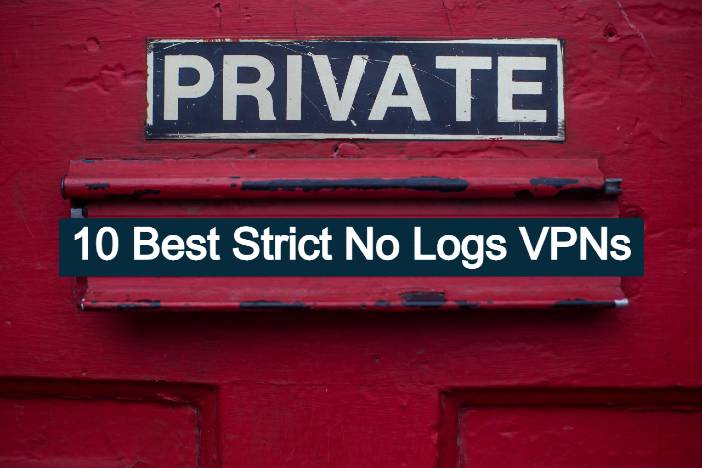Arguably, the major priority of a VPN should be to provide absolute privacy. With concerns for internet privacy at an all-time high this year, users want to be guaranteed that the VPNs they sign up to ensure complete anonymity. VPNs with the best strict no-log policies do just that.
There are several reasons internet users seek the cloak a VPN provides. Government censorship, for example. Governments frequently request information from Internet Service Providers (ISPs). If the VPN stores logs of your internet activities, that information may be demanded from them instead.
User information may also be used for several other purposes. Dubious VPN providers may sell your information to the highest bidders for money. Hackers want to get access to your information, so they may steal from you.
Many VPN providers insist that they are strict with upholding user privacy. The terms “no-logs” and “zero logging” are regularly bandied about. In reality, most are far from firm with the enforcement of these terms.
I’ve listed what I have found to be the 10 best strict no-log VPNs providers in the market presently. The list was compiled after scouring through scores of VPN Privacy Policies. Because very few people read this important document, it is usually easy for a VPN to get away with promising no logging on their websites when they actually do not.
Many of the VPNs on this list have had their services and policies independently audited.
Best Strict No Log VPNs
1. NordVPN
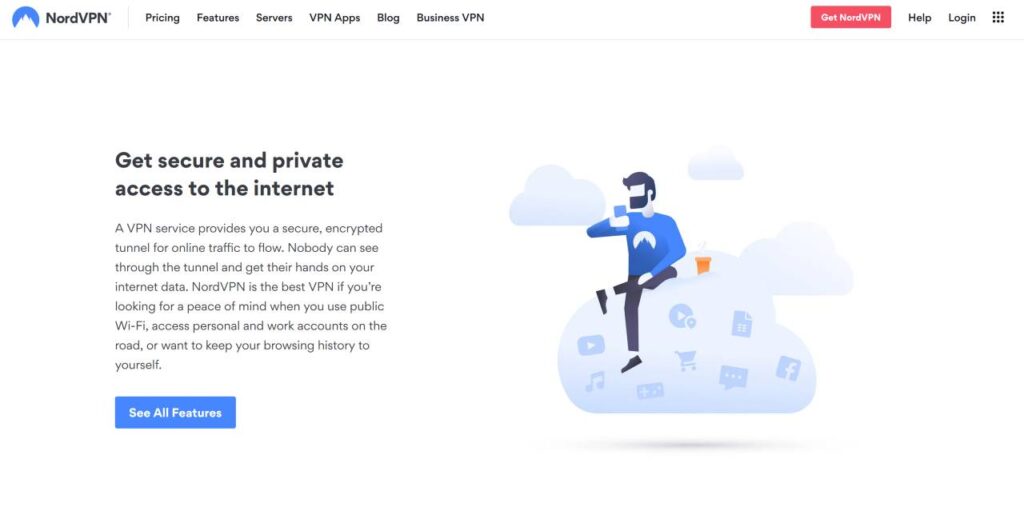
Routinely leading most of my best lists is NordVPN, and it promptly shows up on this ranking once again. NordVPN has a reputation for being one of the fastest and most reliable VPNs in the industry. They are no different when it comes to protecting your privacy.
Based in Panama, NordVPN operates outside of the jurisdiction of the 5 Eyes, 9 Eyes, 14 Eyes Alliance, which are a threat to how truly anonymous you can be on the internet. Panama has strong data privacy laws, and NordVPN takes advantage of that. They guarantee strict zero-logging, and they keep to their word.
You can be assured of this because NordVPN has undergone an independent audit to test its compliance. Twice. Both audits were carried out by PwC in Switzerland, first in 2019, and then in 2020. The auditors confirmed that NordVPN’s claims regarding its lack of logging are honest. NordVPN may be aiming to make their audits an annual occurrence, which would be great to see.
In addition to privacy, NordVPN employs top-notch security features to keep your activities and data safe. It uses military-grade AES 256-bit encryption to scramble user data and comes with DNS/IPv6 leak protection. There’s also an automatic kill switch, which breaks the connection when there is an interruption, to protect data from getting exposed.
Onion over Tor, Double VPN, and CyberSec malware and ad blocker are some of its other impressive security features.
NordVPN is compatible with Windows, macOS, Android, iOS, Linux, some internet browsers, and routers. Users are allowed to connect up to 6 devices simultaneously on one account.
To try out NordVPN, you can take advantage of its 30-day refund policy.
2. ExpressVPN

ExpressVPN is renowned for lightning-fast internet connection speeds. It is also popular for being reliable and feature-rich.
It is also a privacy-concerned VPN provider. ExpressVPN has in place, various features and policies to ensure that their users never have to worry about just how anonymous they are. Among these, is a strict no-logs policy.
Based in the British Virgin Islands, it operates outside of the 5/9/14 Eyes Alliance. This means that being forced to hand over user information is not something they have to deal with. In any case, ExpressVPN does not keep that information in the first place. Like NordVPN, it has undergone two security audits to test the veracity of its no logs claims.
The results of both audits carried out by Cure53 and PwC indicate that ExpressVPN holds true to its promise to provide absolute privacy and security to its users.
ExpressVPN runs the TrustedServer technology, which has all the servers running on RAM. This way, all data gets wiped after every reboot. This has been tested and found to work perfectly.
In terms of security, ExpressVPN makes use of the high-level AES 256-bit encryption. There is an array of protocols available, including OpenVPN and IKEv2. It also offers its own protocol, called Lightway. With every downtime in connection, a kill switch automatically kicks in to stop data from potentially getting exposed.
ExpressVPN works on Windows, Mac, Android, Linux, iOS, browsers, and routers. Up to 5 devices can be connected simultaneously on a single account. If you decide to try it out, there’s a 30-day money-back policy.
3. Surfshark
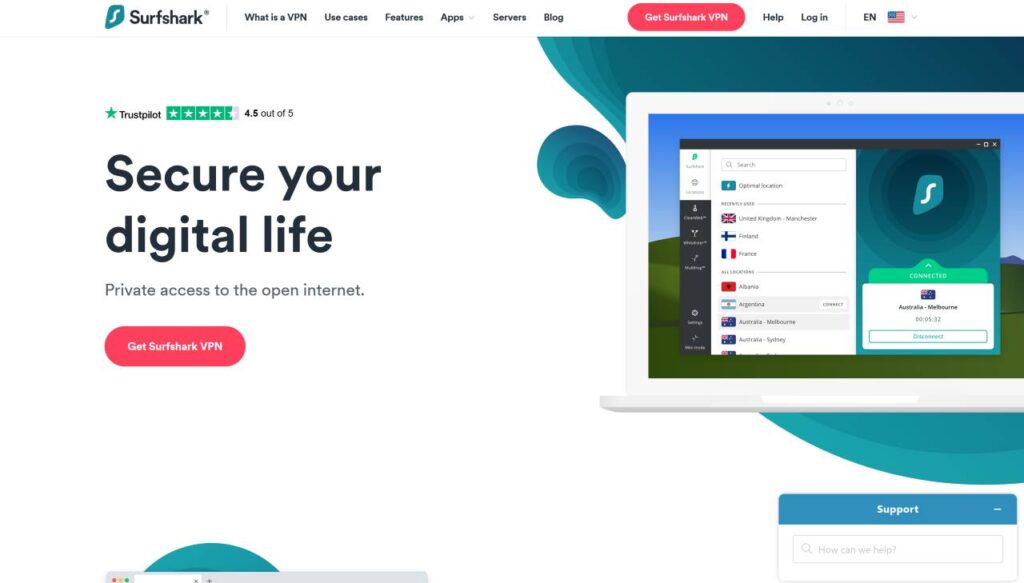
Surfshark is a super-affordable VPN service, but what pushes it to this list is its commitment to data privacy. Like ExpressVPN, Surfshark is also based in the British Virgin Islands and so it is not bound by the data laws from that region. It enforces a strict no-logs policy and comes with extra features that help ensure users are fully anonymous.
Surfshark has claims to an independent audit, carried out by Cure53. It is important to note that unlike those carried out on some of the top providers, this audit was of its Chrome and Firefox extensions. Still, their privacy policy guarantees that no identifying logs or metadata are stored on Surfshark’s servers.
When it comes to security, Surfshark offers all the core security features that are expected of a top VPN service. It also comes with an array of extras. It uses the bank-level 256-bit encryption technology to secure your data and protect it from prying eyes. There is an automatic kill switch that protects your data when there is downtime.
Additionally, it has several other security features such as MultiHop which pushes your traffic through different servers, and Camouflage Mode, its obfuscation feature. Camouflage Mode disguises your VPN use to confound anti-VPN technology.
Surfshark works on Windows, macOS, Linux, Android, iOS, Chrome, Firefox, Opera, and internet browsers. It allows users to connect unlimited devices to a single account simultaneously. You are offered a 7-day free trial, to begin with, and a 30-day money guarantee.
4. CyberGhost

CyberGhost has its headquarters in Romania, which is outside of the jurisdiction of the countries bound by intelligence-sharing agreements. It also has an iron-clad no logs policy to further assure you that you do not have to worry about how private you are, using their services.
Back in 2011, CyberGhost became one of the first VPNs to express its commitment to privacy by launching its Transparency Report. This regular report highlights all the requests it receives from authorities for user data. Since 2019, CyberGhost has published this report every three months.
CyberGhost comes with all the industry-standard security features. There is an AES 256-bit encryption to shield your data. It offers the OpenVPN, IKEv2, and WireGuard protocols to choose from.
On the OpenVPN protocol, there is an option to use a random port any time you connect. In addition, CyberGhost also comes with an automatic kill switch and split tunneling features.
The clients that CyberGhost has for download make it a great choice for VPN newbies. They come with user-friendly interfaces and are easy to use. Windows, macOS, Linux, Android, and iOS users can download and use it.
It is also compatible with Amazon Fire and several internet browsers and routers. Users are allowed to connect up to 7 devices at the same time.
To test CyberGhost out risk-free, you can take advantage of a generous 45-day refund policy.
5. IPVanish
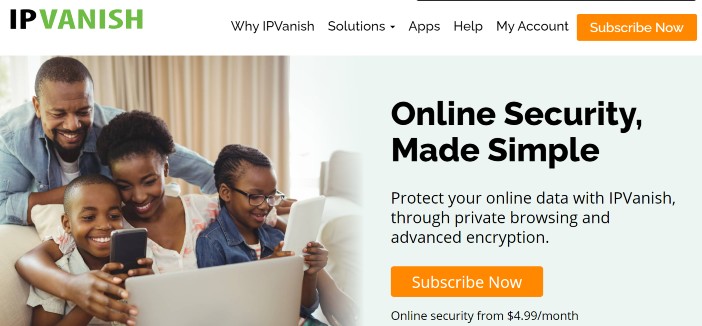
The next option on this list is based in the United States, which is a stronghold of the 5/9/14 Eyes Alliance. But don’t let that scare you. IPVanish has put measures in place to ensure that you are entirely anonymous when you are on the internet.
It keeps absolutely no user logs on its servers. This means that even if the US authorities demand identifying logs, there will be none to hand over. In addition, IPVanish owns all of the servers that it operates instead of leasing them, which means that they have control over them.
With its obfuscating feature, IPVanish users can evade geo-restrictions with VPN-blocking technology. Customers can also make payments with Bitcoin.
To secure user traffic, it uses AES 256-bit encryption with several protocols to choose from, including OpenVPN. It also comes with an automatic kill switch and DNS leak protection.
IPVanish is compatible with all the major platforms, and also has a Chrome extension. You can use it simultaneously on an unlimited number of devices. For new users, there is a 30-day money-back guarantee on offer, if you decide to opt-out of a commitment.
6. Private Internet Access

Like IPVanish, Private Internet Access is also headquartered in the United States of America. It has a very strict zero-logs policy, though, a claim that has been proven to be factual multiple times in court.
Most recently, a hacking trial in a San Jose Federal court led to investigations that showed PIA’s insistence that they don’t store any form of user-identifying information is not unfounded. Other demands by authorities for user logs have been rebuffed, as they don’t have access to any.
PIA also comes with top of the line security features. By default, its data encryption is set to AES 128-bit but users can always switch to the more-secure 256-bit encryption. It offers different protocols to choose from, including OpenVPN and WireGuard. For added security, you get an automatic kill switch and DNS and IPv6 leak protection.
It has apps available on Windows, Linux, macOS, iOS and Android. Users can connect up to 10 devices on one subscription at the same time.
There is a 30-day money-back guarantee if you want to test it out, risk-free.
7. PrivateVPN
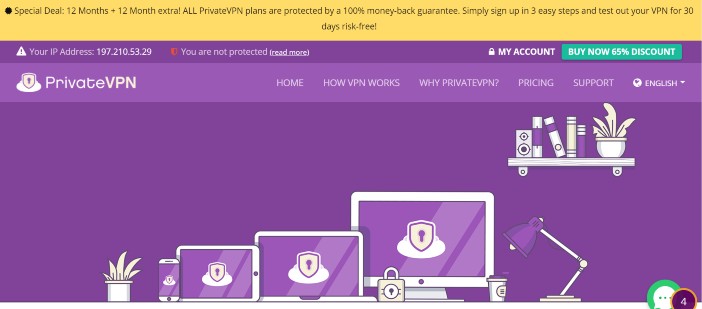
PrivateVPN does not have a huge network of servers as some other options on this list. With that in mind, if privacy is your primary concern, it takes its name seriously and has got you covered.
It is a strict no-logs provider. This is particularly important, considering PrivateVPN is based in Sweden, a member of the 14 Eyes Alliance. Its Privacy Policy is emphatic about not storing any user information that can be traced back to them. That means browser history, traffic destination, IP addresses, and others are not saved to its servers.
To ensure that your data is secured against potential interception, PrivateVPN makes use of the bank-level 256-bit encryption with a 2048-bit DH key. It also offers an automatic kill switch to shut your traffic down when there is an interruption in the connection. DNS/IPv6 leak and Wi-Fi Security features also serve to keep you fully secured on the internet.
You can download PrivateVPN on Windows, macOS, iOS, Android, and Linux. Up to 6 devices are allowed to connect simultaneously.
To test it out, you will be backed by a 30-day money-back guarantee.
8. ProtonVPN
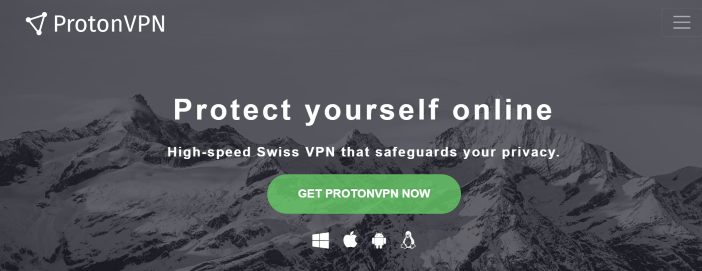
ProtonVPN is a relative newcomer to the scene. It comes from the makers of ProtonMail, an email service renowned for its privacy and security. Unsurprisingly, that track-record is carried over to the VPN.
It is headquartered in Geneva, Switzerland. That automatically gives it a comparative advantage over many VPN providers when it comes to privacy. Switzerland has very strong privacy laws and is not part of the 5/9/14 Eyes Alliance. To be doubly sure, ProtonVPN has a strict zero-logging policy. You can also opt for making payments via cryptocurrency.
ProtonVPN has a Warrant Canary, which is a sort of transparency report that reports any requests it receives to hand over user information. To show an even clearer commitment to privacy and transparency, its apps are now open-source on all platforms. That means that developers can carry out independent audits on them. This is a first in the industry.
In terms of security, user data is protected by AES 256-bit encryption, with 4096-bit RSA and HMAC SHA 384 authentication. It offers OpenVPN and IKEv2/IPSec protocols. There are also kill switch and Always-on VPN, and Tor over VPN features.
The platforms ProtonVPN works on are PC, Mac, Android, iOS, Linux, and internet routers. It provides access to up to 5 devices simultaneously, on one account.
New users are allowed to request for a refund within 30 days of purchase.
9. VyprVPN
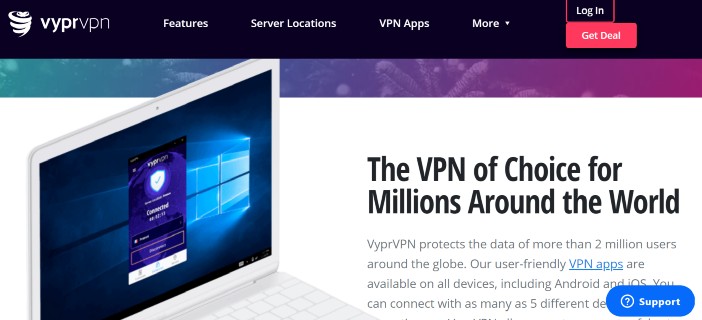
A couple of years ago, VyprVPN would have been nowhere near this list. It kept some logs for up to 30 days. Now headquartered in Switzerland, VyprVPN has transitioned to a strict zero-logs VPN provider.
VyprVPN’s claims that it no longer stores any personal logs have been verified. An independent audit was carried out by Leviathan Security Group on its operations. The audit is the first of its kind in the industry, with VyprVPN publishing full and detailed results of its findings.
User traffic is protected by AES 256-bit encryption. It comes with OpenVPN, WireGuard, L2TP/IPSec, and PPTP protocols in addition to its own proprietary Chameleon technology. You also get an automatic kill switch and a NAT firewall that shields your device from hackers and malware.
VyprVPN is compatible with Windows, macOS, Linux, Android, and iOS platforms. It also works on some browsers and internet routers. VyprVPN only allows up to 3 simultaneous device connections on one subscription.
To test VyprVPN out risk-free, you can take advantage of its 30-day refund policy.
10. Hide.me
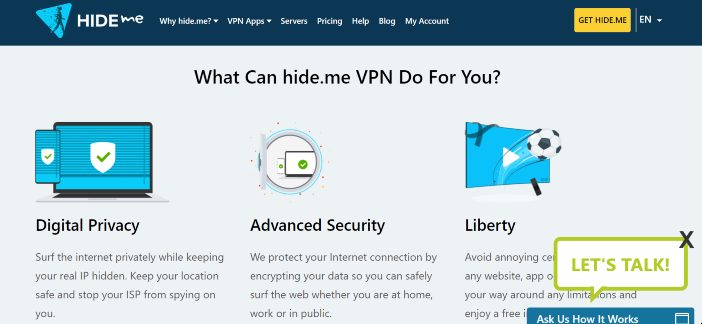
Rounding up this list of the 10 best strict no log VPNs is Hide.me, a VPN provider based in Malaysia. Hide.me promises that it does not log any personal data and does not monitor and log browsing behavior.
One of the first VPN providers to be independently audited, Hide.me’s audit by Leon Juranic confirmed that its privacy offers are genuine. Hide.me has also routinely released transparency reports since 2013. These reports disclose all of the requests that it receives to hand over user information.
Hide.me is equipped with high-level security features. It uses the AES 256-bit encryption to scramble user data. Users can switch between the wide range of protocols it has on offer. They also provided a kill switch, traffic obfuscation, and DNS/IPv6 leak protection.
It is compatible with all the major platforms. The number of connections you can use at the same time is generous, allowing up to 10 device connections.
New users can cancel their subscription and get a refund within 30 days of purchase, no questions asked.
FAQs
What are VPN logs?
VPN logs are entry data on your activity when you are connected to the internet through a VPN. There are different kinds of logs that a VPN may store, but not all of them are potentially harmful to the user.
Usage logs provide information about your activity with such data as your IP address, your browser history, and what you may have downloaded or uploaded.
Connection logs on the other hand provide technical information such as the IP address assigned to you by the VPN, timestamps, and the amount of data you used while on the internet.
Connection logs do not pose as much of a threat to user privacy as user logs do.
Why do VPNs keep logs?
There are many reasons why VPNs may store logs.
- They may be required to do so by laws or government authorities.
- To limit the number of devices connected simultaneously on a subscription.
- For VPNs who don’t offer unlimited bandwidth, logs may be kept to check bandwidth.
- For maintenance and to help troubleshoot issues.
- Free VPNs may store logs to sell to advertisers.
